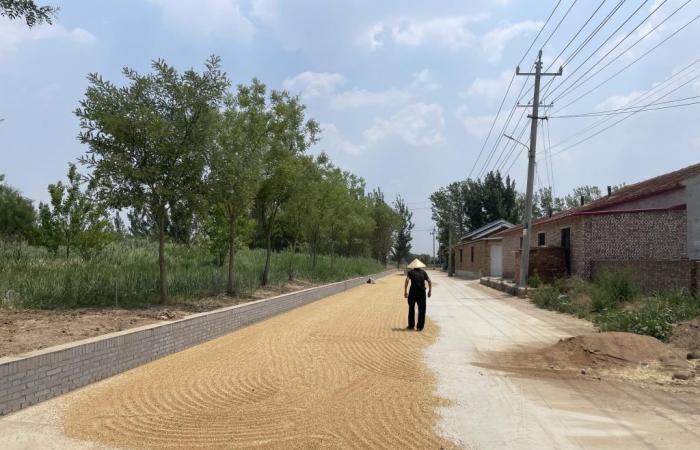In the news in Asia This Wednesday, July 3, peasant anger in China over the fall in grain prices. Farmers’ incomes are badly affected, particularly in the northern and eastern regions marked by drought.
From our correspondent in Beijing,
A long wooden rake attached to the back of an electric tricycle sifts the wheat spread out on a strip of concrete. The operation is repeated as many times as necessary, wherever possible: on the basketball court near the town hall, on the roads leading to the farms. The precious harvest must dry before being sold to middlemen.
Falling wheat prices and rising production costs
Except that this year, wheat is no longer “worth” a radish, this farmer tells us, whom we will not name, like all the people we met during this report. We earn almost nothing, at most a few hundred yuan. People are very unhappy. You cultivate the land, but the prices are so low that we can’t do anything with our work. We can barely sell our harvest. ! Unfortunately, that’s all we have to live on ! »
After seven months of hard work, these farmers in Hebei – the province surrounding the Chinese capital – have seen the price of wheat fall to 1.18 yuan – 15 euro cents – per kilo. A double whammy as the north of the country suffered several weeks of drought in June. With a conical hat screwed on his head to protect himself from the burning blades of the midday sun, this farmer says that everything else has increased. We have to rent the machines, it’s about 100 yuan – 13 euros – to harvest an acre of wheat; 40 to 50 yuan for plowing, and 35 yuan per acre for irrigation. So that we have nothing left in the end. »
To view this content X (Twitter), it is necessary to authorize audience measurement and advertising cookies.
Accept
Manage my choices
On June 8, 2024, a video went viral on social media before being censored. A farmer complained about earning less than 200 euros for more than 7 hectares of wheat harvested, while in the cooperative medical system, health insurance for farmers costs 380 yuan – about 50 euros – per year. And to call out the authorities who have been eliminating subsidies for several years: ” We don’t need new street lights or new roads. First we need to solve the problem of prices, so that farmers no longer have to pay to work. »
A bottle of mineral water is more expensive than a kilo of wheat
This complaint has been widely reported, particularly in drought-affected regions. In the central province of Henan last month, a farmer told a local daily that he had to queue every day, sometimes as early as 2 a.m., to get water from a reservoir reserved for crops. The central plains and northern China are short of water, while the south and the Yangtze basin are plagued by repeated flooding. Water is unevenly distributed across the continent. Fortunately, Hebei’s reservoirs seem to be better supplied, but there too the drought is not helping matters… We can’t even harvest the corn, because some of it has dried up. Even though we pump water from the nearby river all the time to water the fields, the soil is so dry that irrigation is difficult. And of course, this extra water comes at a cost. »
In the villages we pass through, the heavy metal doors of the farm properties struggle to contain the anger. With current prices, the profit margin is too thin », complains a farm owner who employs employees on 28 hectares of farmland. You realize, he says, accompanying his annoyance with a gesture of his hand: the small bottle of water you just drank can buy several kilos of wheat! “According to the latter, there is a lack of political will: ” Does China really care about farmers today? In the past, emperors prioritized crops because if people don’t have enough to eat, it could cause chaos. »
Small farms and overcapacity
Difficulties in making a living from one’s work, especially when it comes to small farms and in a slow economic context. On the walls of homes, slogans in red letters encourage people to “ work hard for the country ” or to have children, and telephone numbers written in very large letters. Former farm workers offer their arms for earthworks. Knowing that many here only cultivate small plots of land – 2 or 3 acres of agricultural surface at most – confides this grandmother who brings her grandson home from school. “ This year, grain prices have dropped. Look over there! They are still drying the harvest. They are hesitant to sell. With prices so low, families are living from day to day. Farming is no longer profitable, but we have to make do, that’s the way it is (laughs). ».
Embarrassed laughter from the locals, but also from the middlemen who several times asked us to leave when they realized we were journalists. On the national road, a long string of roads that connects the rural villages of the region, the grain plants can be identified by the large piles of corn dumped by the trucks that follow one another onto a metal plate on the ground that serves as a scale. Near a mini grain silo, farmyard roosters wait in ambush for the lost grains. Leaning on his shovel, this employee of the plant has an explanation for the fall in prices: the country’s grain overcapacity: ” The yields are sufficient, so wheat and corn are cheaper. It is the food processing plants that set the prices. In fact, production was too high this year. »
Imports from Russia and ban on demonstrations
Too much production? While the Chinese state has set itself the objective self-sufficiency in cereals in 2032. Others criticize imports, particularly from Russia, which would drive down farmers’ incomes. Russia increased its wheat exports to China by almost 12 times between January and March, to reach $15.8 million, while wheat shipments to China fell by 18% year-on-year, according to Russian data reported by the Global Times. « If you ask for a higher price, they import foreign grain. You see Poland and France, when farmers protest there, prices go up. But in China, the price of grain keeps falling. And if you dare to protest, you risk going to jail. Some people talk about protesting in Beijing, it’s absurd. »
Impossible demonstration says this cereal producer, ” We are like grass bent by the wind, we go where the government blows “, poeticizes another. In 2024, China remains the world’s leading producer of rice, the leading producer of wheat and the second-largest producer of corn.






